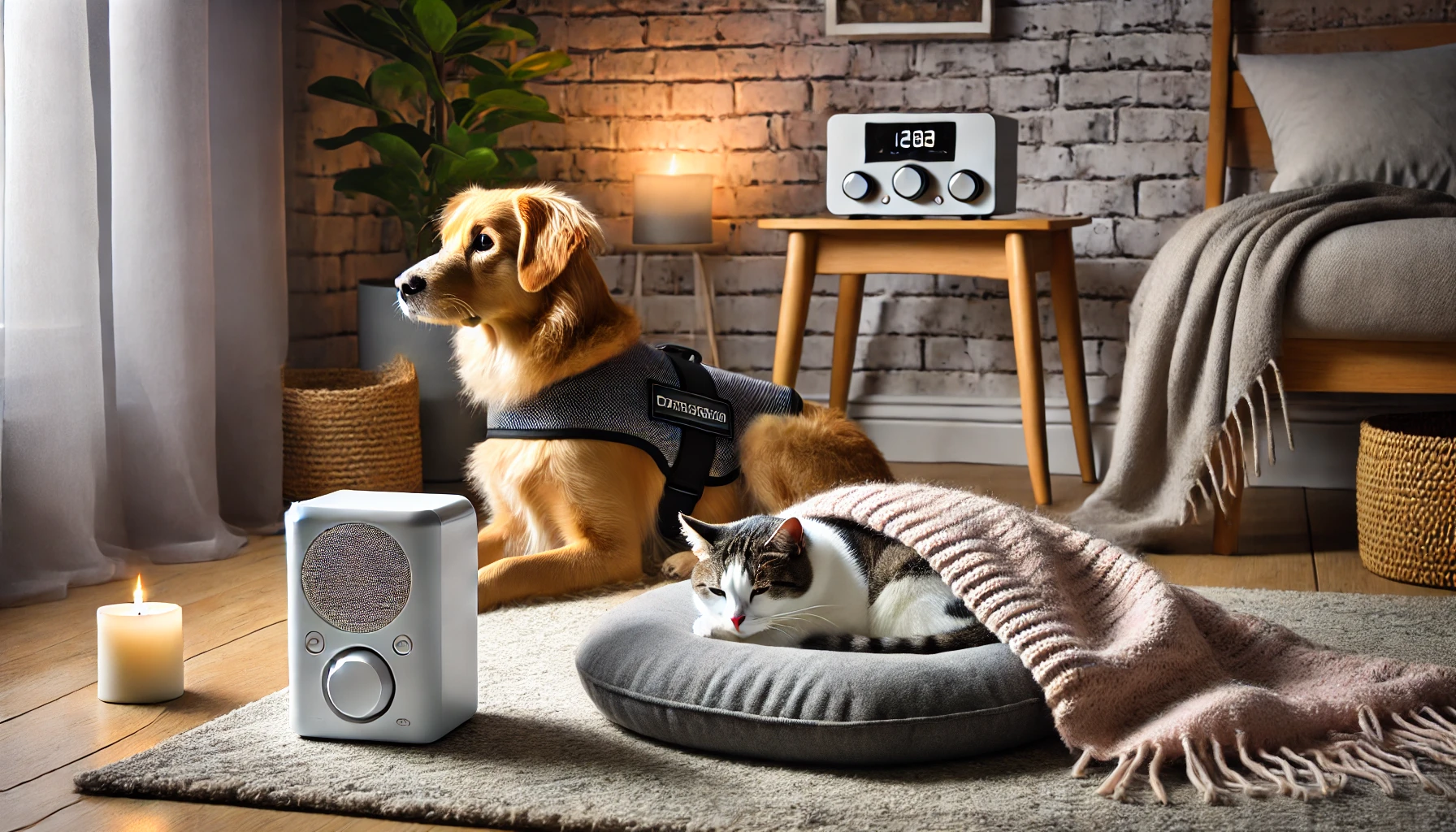Many pets experience fear or anxiety when exposed to loud noises such as fireworks, thunderstorms, or construction sounds. While this reaction is common, it can be distressing for both pets and their owners. With the right approach, you can help your furry companion feel safer and more comfortable during noisy events. Here’s a detailed guide to managing and reducing your pet’s fear of loud noises.
Understanding Noise-Related Anxiety
Fear of loud noises, also known as noise aversion, stems from a pet’s natural survival instincts.
Why Pets Fear Loud Noises
- Unpredictability: Loud sounds like fireworks or thunder are sudden and often accompanied by vibrations, making them frightening.
- Heightened Senses: Dogs and cats have more sensitive hearing than humans, making loud noises feel overwhelming.
- Negative Associations: Past traumatic experiences, such as being caught in a storm, can make pets more susceptible to noise anxiety.
Breeds and Individual Differences
- Some dog breeds, like herding dogs (e.g., Border Collies), may be more prone to noise sensitivity due to their heightened alertness.
- Cats, while generally less expressive than dogs, may also exhibit fear by hiding or fleeing from loud noises.
Signs of Noise Anxiety in Pets
Recognizing the symptoms of noise anxiety is the first step in addressing the issue.
Common Signs in Dogs
- Excessive panting, trembling, or drooling.
- Pacing, whining, or barking.
- Attempting to escape by digging at doors or windows.
Common Signs in Cats
- Hiding in secluded spots, such as under furniture or in closets.
- Flattened ears, wide eyes, and an arched back.
- Refusing to eat or coming out of hiding for extended periods.
How to Help Your Pet Overcome Their Fear
Create a Safe Space
Providing a secure, quiet area can help your pet feel protected during noisy events.
- Designate a Quiet Room: Choose a room away from windows and external noise sources.
- Add Comfort Items: Include familiar items like your pet’s bed, favorite toys, or a blanket that smells like you.
- Soundproof the Area: Use heavy curtains, rugs, or soundproofing panels to minimize external noise.
Use Calming Aids
Several tools can help ease your pet’s anxiety during loud events.
- Pheromone Products: Diffusers, sprays, or collars that release calming pheromones can help reduce stress.
- Anxiety Wraps: Tight-fitting garments like ThunderShirts provide gentle pressure that mimics swaddling, calming your pet.
- Natural Remedies: Herbal supplements or treats containing chamomile, valerian root, or CBD (if recommended by your vet) can have a soothing effect.
Mask the Noise
Reducing your pet’s exposure to the loud sounds can significantly ease their fear.
- Play White Noise: Use a white noise machine, fan, or calming music to drown out external sounds.
- Close Windows and Doors: Keep them shut to block noise and reduce vibrations.
- Turn on the TV or Radio: Playing familiar sounds can distract your pet from the noise outside.
Gradual Desensitization
Training your pet to become less sensitive to loud noises over time can be effective.
- Play Recorded Sounds: Start with recordings of thunder or fireworks at a low volume.
- Reward Calm Behavior: Use treats and praise to reinforce calmness as they hear the noise.
- Increase Volume Gradually: Over several weeks, slowly raise the volume while maintaining positive reinforcement.
Distract with Activities
Keeping your pet engaged can shift their focus away from the noise.
- Interactive Toys: Give your pet puzzle feeders, treat-dispensing toys, or chews to keep them occupied.
- Training Sessions: Practice commands or teach new tricks to divert their attention.
- Playtime: Engage in games like tug-of-war or fetch to burn off nervous energy.
Stay Calm and Supportive
Your pet looks to you for reassurance, so your behavior plays a key role in their response.
- Maintain a Calm Demeanor: Speak in a soothing voice and avoid showing frustration or panic.
- Offer Physical Comfort: If your pet seeks closeness, pet them gently or let them sit on your lap.
- Avoid Overreacting: Don’t over-coddle, as this may reinforce the idea that there’s something to fear.
Plan Ahead for Predictable Noises
For events like fireworks or planned construction, prepare in advance to minimize your pet’s stress.
- Exercise Beforehand: A long walk or play session earlier in the day can help tire your pet, making them less anxious.
- Feed Them Early: Give them their meal before the noise begins to avoid stress-induced refusal to eat.
- Use Calming Products in Advance: Start using pheromone diffusers or anxiety wraps a few hours before the event.
When to Seek Professional Help
If your pet’s fear of loud noises is severe, professional intervention may be necessary.
Consult a Veterinarian
- Discuss medications or sedatives for extreme cases of anxiety.
- Rule out underlying health issues that may exacerbate stress.
Work with a Behaviorist
- A certified animal behaviorist can create a tailored desensitization and counter-conditioning plan.
- Behaviorists can also help identify specific triggers and teach you techniques to manage your pet’s reactions.
Preventing Noise Anxiety
Taking proactive steps can reduce the likelihood of your pet developing noise anxiety.
- Early Socialization: Expose puppies and kittens to various sounds in a controlled and positive manner.
- Positive Associations: Pair new or potentially scary sounds with treats and play to create positive memories.
- Regular Desensitization: Periodically expose your pet to recordings of loud noises at low volumes to maintain their tolerance.
Conclusion
Helping your pet overcome their fear of loud noises requires patience, consistency, and a deep understanding of their unique needs. By creating a safe environment, using calming aids, and practicing desensitization, you can help your furry friend feel more secure during noisy events. If needed, don’t hesitate to seek professional advice for additional support. With time and care, your pet can develop confidence and resilience, ensuring a happier and more relaxed life.

